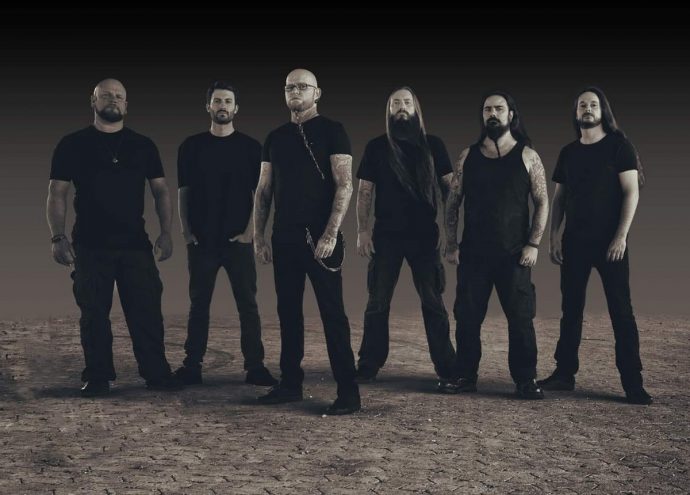
(For the final SYNN REPORT of 2020, Andy Synn reviews all the rcords in the significant discography of the unorthodox German black metal band Maladie.)
Recommended for fans of: Solefald, Sigh, Dødheimsgard
Well, it’s the end of the year as we know it and I feel… well, to be quite honest I’m not sure how I feel.
After all, it’s been a very strange (not to mention challenging) twelve months for most of us, with this site being one of the very few constants capable of brightening the bleak monotony of daily life in 2020.
So, I thought to myself, why not end the year with a feature on a band who are, in their own way, just as strange, and just as challenging (though far more rewarding)? Which is why you’re about to read my in-depth analysis of the still-expanding discography of the multi-headed metallic entity known as Maladie.
Musically-speaking the band’s sound is rooted in Black Metal, sure… but it’s also wilfully Avant-Garde, wickedly Progressive, jazzily indulgent, turbulently Technical, and everything in between, running the gamut from strafing blastbeats to swirling saxophone to groove-heavy riffs to grandiose synths, all topped off with a cacophonous chorus of shrieks and snarls, barks and bellows, sonorous croons and high-toned harmonies delivered in a polyglottal mix of English, French, Spanish, German, and Latin!
As complex and chaotic as all that sounds though, Maladie aren’t afraid to deploy hooks and/or heaviness to keep their listener(s) engaged, and – as a result of the band’s kitchen-sink-in-a-blender approach – there’s a good chance that there’ll be something here to appeal not just to fans of the three bands mentioned above (Solefald, Sigh, and Dødheimsgard) but to people who love Satyricon, Sear Bliss, Arcturus, Ne Obliviscaris, Vintersorg, In Vain, Ihsahn’s solo work, and more.
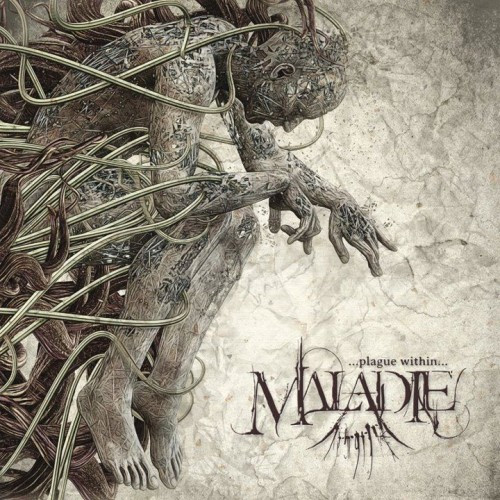
PLAGUE WITHIN – 2012
Following a teasing passage of piano, “Animus Fatalis” kicks things into high-gear with a veritable barrage of blastbeats and blood-chilling vocals, suggesting that what you’re about to hear is going to be a ripping, albeit relatively straightforward, album of belligerent, bombastic Black Metal.
And while, truth be told, Plague Within probably is the most “orthodox” album of the band’s career – the song then drops into some seriously gnarly, Satyricon-esque riffs that are positively swollen with sinister swagger – there’s already hints here (such as when the band suddenly transform into a highly melodic, fluidly proggy Tech-Death band for a few moments in amongst all the blistering blasts and grim grooves) that Maladie, as I’ve already warned you, are a highly un-orthodox band.
As the classically-inspired piano piece of “Imperditus” gives way to the epic tremolo riffs and ecstatic shrieks of “Yersinia Pestis” the band reaffirm that, for all their strange and outlandish ideas, they are most certainly a Black Metal band at their core, albeit one which isn’t afraid to extend their songs past the nine-minute mark, while also throwing in an audacious array of snarls and growls and semi-operatic croons (sometimes all at the same time) in order to get their point across.
“Pes Equinovarus” is all twisted technicality, disturbing dissonance, and angular atmospherics, and probably one of the most aggressive and abrasive songs in the band’s entire back-catalogue, while (following another short, sooting piano-led interlude) “1979” attacks the ears like Borknagar on bath salts, equal parts extravagant extremity and surprisingly majestic melody.
Concluding with the moody, synth-and-piano-based pseudo-ballad that is “Transgressus”, Plague Within quickly established that Maladie are indeed an odd and unusual band… although it wouldn’t be for a few more years until it became clear just how odd and how unusual they were!
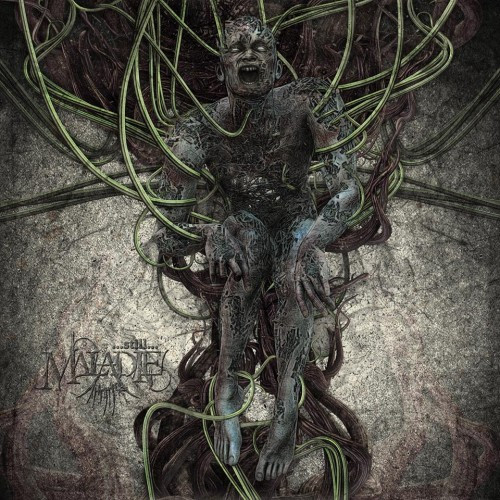
STILL – 2015
After a three-year period of what I can only imagine must have been painstaking work, the band returned – renewed, re-energised, and perhaps even a little more reckless – with an album that was several times more ambitious in scope than its predecessor.
Case in point, the subtle symphonics and choral vocals which open “Demutatio” soon give way to a deluge of ultra-aggressive riffing, punishing blasts, and stabbing synths which re-establishes how vicious and visceral they can be while also, as you’re about to discover, providing a bit of “bait and switch” sleight of hand, as the song then flips things around to transform into a piece of melodramatic Prog-Metal (complete with evocative, emotive, clean-sung vocals), before lurching back into the blast-zone only to pivot once more into saxophone and synth-drenched avant-garde atmospherics.
It’s a lot to take in, that’s for certain, and while the sombre interlude of “Agnitio” provides a welcome breather you’re unlikely to be prepared for just how ridiculously OTT the 18-minute “Inexistentia” is, layering both soaring cleans and scorching snarls over strafing blasts and densely-packed riffs, threaded through with high-voltage tremolo melodies, nimble, Melodeath-esque picking patterns, and shamelessly show-off lead parts, all building towards and extended (and poignant) piano-based finale.
By contrast “Asperitas” sticks to the harsher end of the Black metal spectrum – all bone-jarring percussion, nerve-jangling dissonance, and jagged-edged grooves – with just the occasional deviation into cathartic clean-sung melody or brassy, noir-ish saxophone for added flavour, after which (following the rippling acoustic notes and fluid lead melodies of “Abdico”) the high-intensity assault of “Discrepantia” delivers just under eight-and-a-half minutes of Progressive Extreme Metal power reminiscent of a more blackened, more technical, and more unpredictable, version of Ne Obliviscaris.
Following the moody interlude of “Circuitus” the searing intensity and symphonic grandeur of “Semivivus” – just under sixteen minutes of Progressive, Technical, Jazz-infused Black Metal weirdness somewhere between Arcturus, Sigh, and The Faceless – builds towards a truly stunning crescendo which serves, in many ways, as the album’s true climax, before the moody, mostly-instrumental soundscapes of “Evigilantem” bring things to a bleak, atmospheric close.
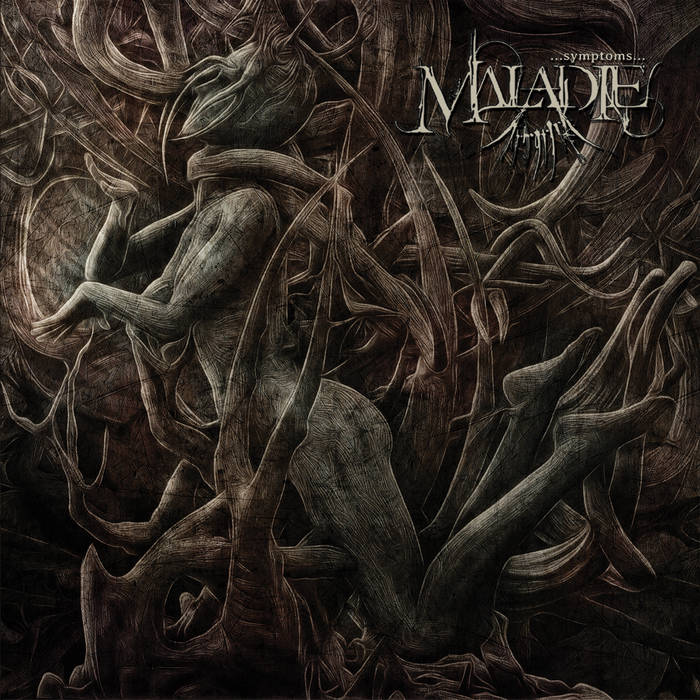
SYMPTOMS – 2016
Despite clocking in at eight tracks (totalling a full forty-one-and-a-half minutes), Symptoms is still regarded as an EP, mostly because of the way it’s structured as a single track (“Divinitas – A Journey) that’s been split up into eight chapters, but which is clearly intended to be listened to as a collective piece of work and designed to allow the band a chance to explore some of their moodier, mellower inclinations a little more.
“Part I” establishes the record’s sombre, noir-ish tone early on, and while “Part II” builds upon this by adding some doomier, more metallic elements, the synths and saxophone remain in an even more prominent position in the mix than ever before.
“Part III” brings back some of the blackened, blasting fury of the band’s first two albums, but shows off even more vocal versatility at the same time, before concluding in brilliantly proggy and provocative fashion a little over five minutes later, after which “Part IV” transitions, over the course of just over four-and-a-half minutes, from a Dark Funeral-style blastathon into an epic Dream Theatre-esque instrumental prog-out.
“Part V” kicks in hard in “true” Black Metal style, with a mix of caustic snarls and soaring cleans, before moving into more ambient, atmospheric territory, only to conclude in an avant-garde blend of these two extremes, throwing together harsh vocals and smooth, jazzy instrumentation in a prog-tinged mash-up, before “Part VI” bookends its dramatic, proggy centre with some of the record’s most intense and aggressively metallic moments.
Last, but by no means least, the climactic pairing of “Part VII” and “Part VIII” slowly moves from a “pure” Black Metal beginning towards an increasingly more progressive and atmospheric approach, finally culminating in the album’s smokey, smooth-jazz finale.
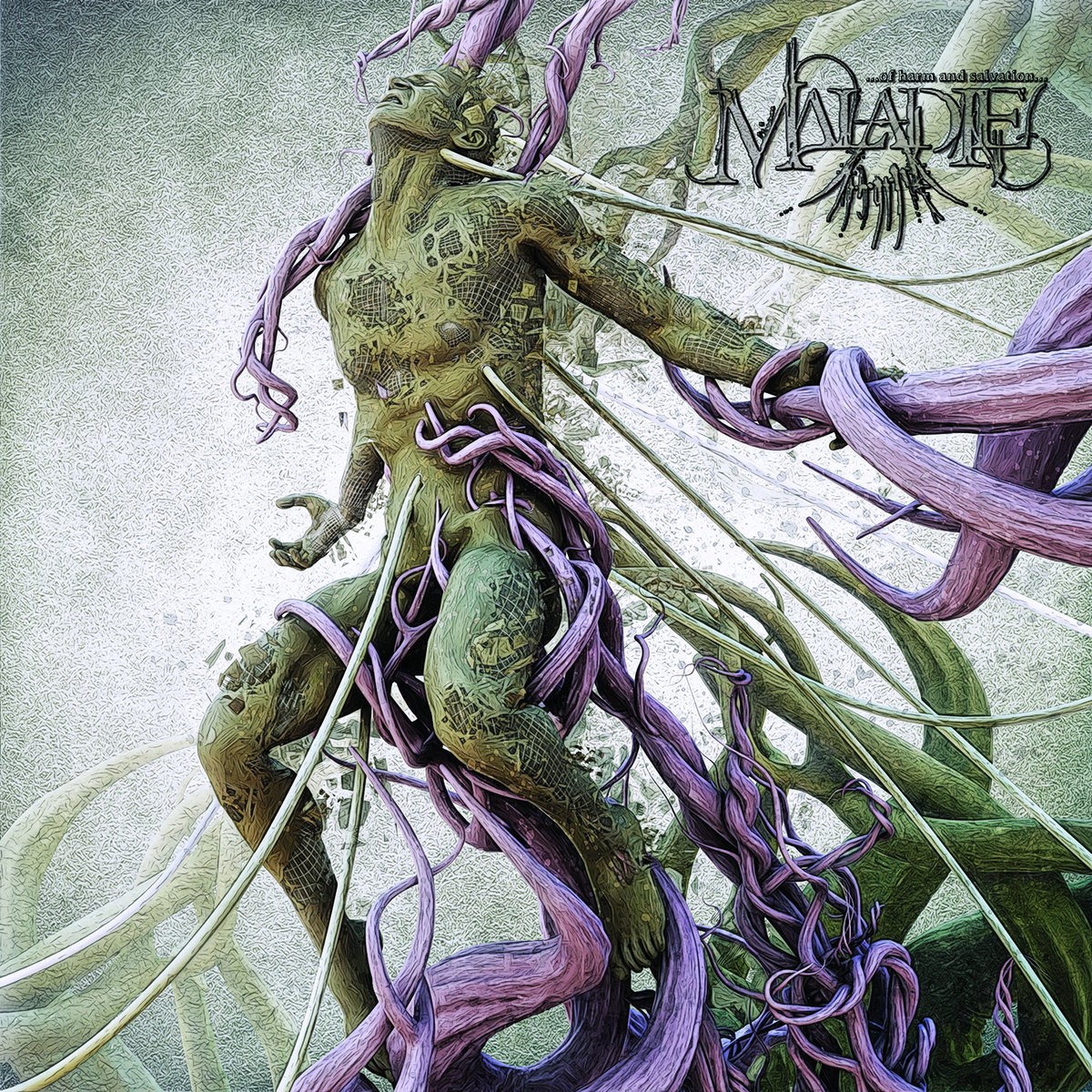
OF HARM AND SALVATION – 2018
Of Harm and Salvation is perhaps the band’s magnum opus, showcasing both a more fluid blend of elements and influences and a more focussed sense of vision (though it still clocks in at over an hour).
Vintersorg-ian opener “Desiderium” takes all the previously-established aspects of the band’s sound – proggy melodies, bone-rattling drums, riveting tremolo riffs, soaring, technical solos, shimmering symphonic synths, and visceral, varied vocals – and integrates them together even more seamlessly while, also infusing them with an added dose of energy and intensity and alsoadding a handful of new elements as well, while the even more extravagant and ostentatious “Depugnare” incorporates some almost gothic overtones into the band’s already over-stuffed and over-the-top blend of contorted complexity and devil-may-care catharsis.
“Oblivio” is a Dødheimsgard-like dervish of blistering fury and off-kilter technicality, all arranged in a purposefully avant-garde (and carefully calculated) fashion, complete with an unpredictable and unorthodox mid-section of semi-operatic, sax-and-symphonic ambience, after which the unsettling Dark-Prog/Jazz-Doom/Black-Noir (think White Ward but weirder) style of “Abominaris” finds the band indulging in an even stranger, more stream-of-consciousness approach to writing and song-structure that constantly challenges the listener’s expectations.
The crisp keys and sax-driven symphonics of “Progressus” provide a welcome breather and a chance to take stock before the erratic, blasting bombardment and cinematic, black-and-white vibes of “Profunditas” (which also features some of the album’s most flamboyantly delivered and exotically arranged clean vocals) continue to throw the album’s audience for a loop, after which the dissonant distortion and anxiety-inducing bursts of brass which punctuate “Renuntiatio” (which also features a very Sigh-esque mix of twitchy riffs and moody melodies) take things even further into the realms of the Avant-Garde.
Closing with the epic, subtly ’80s-influenced instrumental of “Alteramentum”, Of Harm and Salvation may not be an easy album to get into (though it’s certainly capable of cutting you right to the core when it wants to) but it’s undeniably an extremely rewarding record, on multiple levels, once you’ve finally cracked it open and started to really appreciate everything (and I do mean everything) it has to offer.
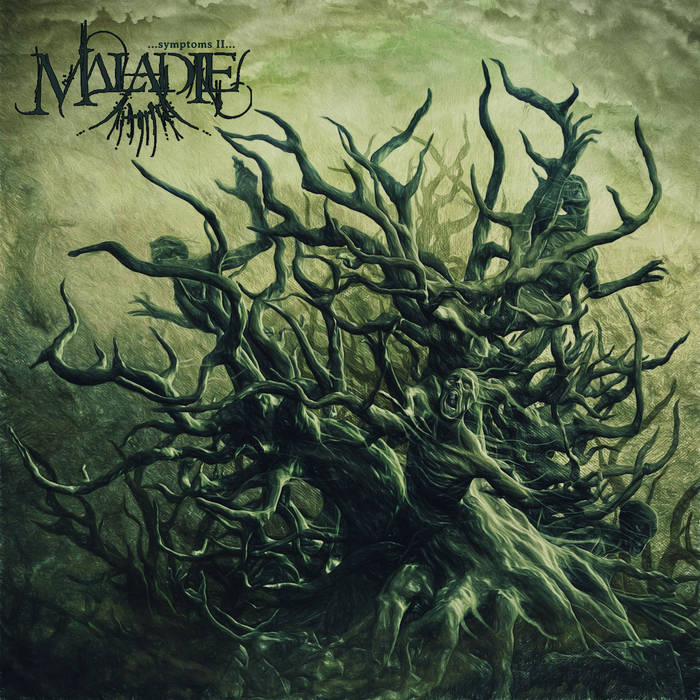
SYMPTOMS II – 2019
The band’s fifth release, Symptoms II, is another “EP” – albeit one that’s still almost thirty-five minutes long – consisting of just four songs, two of which stretch past the ten-minute mark.
The first of these, “Vulnus – Drowning in Lethal Wounds” is eleven minutes of epic, subtly blackened, unexpectedly doomy Progressive Metal that lands somewhere between Vintersorg/Borknagar and Swallow the Sun/October Tide, building from sombre, stately riffs and bleak, blaring saxophone to slow, crushing chords and guttural, growling vocals, before culminating in a climactic passage of moodily melodic, folk-tinged Black Metal fury.
“Abicere – Bleeding Scars” is a haunting, piano and keyboard-based instrumental interlude that dwells on the most mournful and melancholy aspect of the band’s sound before transitioning into the almost fifteen-minute long “Discidium – The Return of Nothingness”, which finds the band exploring the doomier side of their nature in even greater depth, deploying layers of desolate clean vocals, anguished snarls, and harrowing growls over a series of solemn, slow-motion riffs and stark, simmering melodies, all building towards a shockingly strange finale that’s part avant-garde techno-jazz and part abrasive Black Metal assault.
Culminating in the brooding, cinematic strains of “40 – rev. 1979”, whose blend of patient piano, staticky electro-beats, and gorgeous female vocals (along with just a touch of atmospheric tremolo work) makes it one of the most interesting and unique songs in the band’s back-catalogue, Symptoms II is an intriguing diversion from the core thread and focus of the group’s main discography, and one which allows them to explore a different side of their already multi-faceted nature.
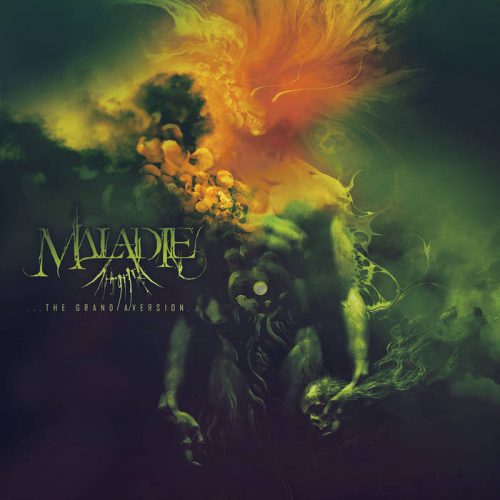
THE GRAND AVERSION – 2020
The band’s fourth album (released back in October) is another extravagant exercise in extremity and excess which, arguably, pushes the band’s sound in even more outrageous and outlandish directions.
Whether it’s the unsettling and unapologetically off-kilter Folk and Jazz-infused Black Metal of “Obtestatio”, or the saxophone-heavy space-oddity of “Distentio” (which scratches and squalls like a more dissonant and discordant version of early Vulture Industries), The Grand Aversion is, at times, both the least and the most “blackened” album the band have done since their debut.
For every moment where they take a wild swing at Jazz or Doom or Folk or Prog there’s another – be it the rapid-fire blasting which drives the capering lunacy of “Detractatio” or the pummelling percussion and twisted tremolo underpinning the epic, Arcturus-adjacent “Corona” – where the group’s Black Metal roots reassert themselves with authority.
Of course, the best parts of the band’s fourth album are those where they combine the various deviant influences and diverse inspirations which make up their sound into something bigger and better (and stranger) than the mere sum of their parts, from the unusual combination of Satyricon-style grooves and Psycroptic-esque riffs which makes up “Source Doloris”, to the Blackened Symphonic Death-Prog of “Lux et Umbra” and the surprisingly seamless fusion of galloping, Aura Noir-ish Black-Thrash and anxiety-inducing, John Zorn-esque Prog-Jazz of “Murmur”.
And then there’s the fantastically weird and wonderful “Aequamentum” which is a bit like… Akercocke meets Imperial Triumphant maybe…? I’m not sure, I just know that I love it.
Is it a perfect album? Not by any means (you’ll have noticed that I’ve not really said much about the various instrumental interludes, which mainly serve to stymie the album’s momentum, and I’m still very much on the fence about the group’s transformation into a full-on Tech Death band during “Rex Vulnere”) but it’s still an irresistibly fascinating, thrillingly ambitious piece of work whose final track – the lurching, dissonant, unapologetically difficult, Progressive Blackened Jazz Metal of “Anastatis” – suggests that there are still strange new worlds for the band yet to explore!

Quote: “with this site being one of the very few constants capable of brightening the bleak monotony of daily life in 2020”: you can’t be so so true Andy… NCS rules \m/
SOLID BAND & DISCOGRAPHIE…!
EXCEPTIONALLY BEARDED GENTS AS WELL…!
‘Inexistentia’ is a truly beautiful song. That main melody is gonna get stuck in my head for days now.